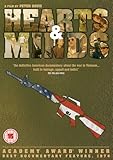Eye For Film >> Movies >> Hearts And Minds (1974) Film Review
Like Michael Moore's Fahrenheit 9/11 (2004), Peter Davis' Hearts And Minds (1974) is an award-winning feature length documentary about an ongoing American imperialist campaign, being waged on false premises. Moore has stated on record that Davis' Vietnam-era expose "is not only the best documentary I have ever seen; it may be the best movie ever". And it seems clear enough that the similarity between these two films is less a matter of coincidence than of conscious influence. Yet, if Hearts And Minds, when viewed today, reveals just how little America's current administration has learnt from the bitter experiences in South East Asia some 30 years ago, it also reveals how little Moore has learnt from the film he is so happy to champion.
Despite the many similarities between the two films (including analyses of the deceits on which the wars were predicated, sections on the cultural insensitivities and even atrocities perpetrated by US troops, and an interview with an American family whose son had been killed in the conflict), the differences in documentary style are pronounced. Where Moore favours a showboating approach, with himself at the centre, Davis neither appears in front of camera, nor offers a voice-over commentary, preferring to let the interviewees and images speak for themselves.
Where Moore merely preaches to the converted (and enrages pretty much everyone else), Davis allows only the converted to preach. Instead of turning to the usual suspects (students, hippies, etc) to express opposition to the aims and conduct of the Vietnam War, Davis elicits views from members of the political elite (Robert Kennedy, Clark Clifford, Daniel Ellsberg), or ex-soldiers (Randy Floyd, Edward Sowders, Stan Holder, Robert Muller, William Marshall), all of whom started off as ardent supporters of the venture. Such journalistic co-option gives the film's overall political tendency an unexpectedly persuasive voice; for it suggests that if these people, who have thought (or fought) long and hard about the war, could, when faced with the realities of America's strategy in Indochina, see their own pro-war assumptions undergo "a substantial revolution" (as former Secretary of State Clifford puts it), then the same might be true for any reasonable member of the viewing public.
Unlike Moore, Davis treats all his interviewees with due respect and gravity. There are no mocking stunts or contrived entrapments here; rather, the subjects are left to be judged by their own words. So it is that Colonel George S Patton III, son of the famous general, proudly declares his men to be "a bloody good bunch of killers," and returned PoW George Coker tells a group of school children how great it was to know that the war was over and "we had won" (BEFORE America's shameful flight from Saigon), while General William C. Westmoreland asserts that "the Oriental doesn't put the same high price on life as does the Westerner".
This last statement follows hard upon harrowing footage of a young South Vietnamese boy, wailing inconsolably at the funeral of his father, while his elderly mother throws herself upon the coffin. This jarring juxtaposition (and many others like it) demonstrates how, even if Davis remains an unseen and almost entirely unheard figure in the film, his masterful use of montage speaks volumes. He spent an entire year editing the film from 200 hours of footage (plus some library footage) and the result is a veritable carpet bombing of contradictory sounds and images, delivering a devastating dialectic all of its own.
If you were ultimately disappointed by the agitprop entertainment of Fahrenheit 9/11 and fancy something more serious and substantial, then check out its older, wiser brother to see how a real documentary is made. It is, alas, as relevant today as it was when it was made, and is as compelling an illustration of the cost of war in human terms as you are ever likely to see.
Reviewed on: 29 Nov 2005

















